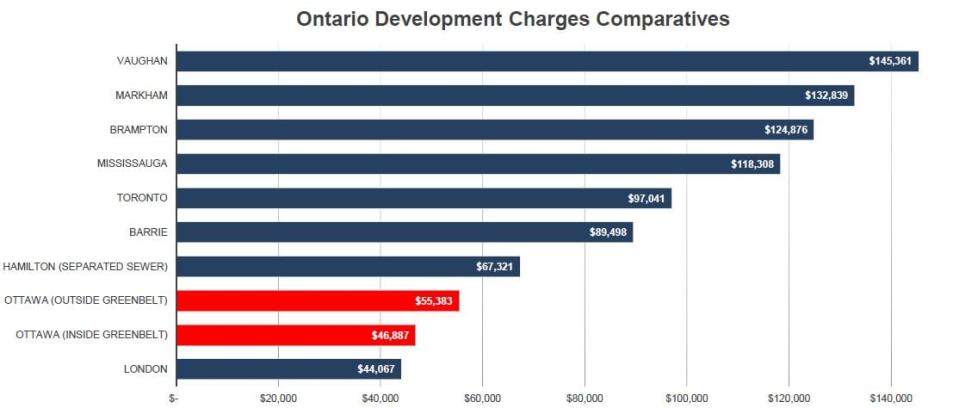Ottawa makes last-minute slash to hike on fees for new home builds

The hefty increase in proposed fees charged to developers when building new homes in the nation's capital was slashed in half on Wednesday — and likely not for the reason you'd think.
The 28 per cent hike, which had both developers and housing experts up in arms this week, was dropped to 11 per cent at the city's planning and housing committee.
It's not politics, suggest city staff. It's math.
That answer, though, masks the fact that the "new denominator" used to calculate the fees was a direct response to concerns from home builders who felt the sudden increase would leave buyers scrambling for extra cash.
The fees developers pay to upgrade or build new roads, sewers, recreation centres and fire stations had been set to go up $12,000 from the current $43,000 to $55,000.
But if city council accepts the numbers unanimously approved by the planning and housing committee on Wednesday, the charges will instead rise $4,700 — less than half the original hike.
While the change is certainly moving in the right direction for the Greater Ottawa Home Builders' Association's Jason Burggraaf, he told CBC he can't endorse it until the city releases a revised background study so the new calculations can be properly scrutinized.
What changed?
Provincial legislation outlines exactly what cities can charge developers and the calculation is deceptively simple.
Essentially, cities add together the cost of infrastructure projects approved by councillors in certain overarching planning documents. Then they divide that by projected growth.
It's that second number that city-hired consultants tweaked to produce an outcome more palatable to all involved.
When Orléans South-Navan Coun. Catherine Kitts questioned how numbers from the background study the city released to the public on March 15 changed so dramatically, project co-ordinator Gary Baker said it was all a matter of assumptions.

Orléans South-Navan Coun. Catherine Kitts questioned how the fees proposed by the city saw such a drastic change in a short time. (Jean Delisle/CBC)
Hemson Consulting Ltd. based its calculations on information from Statistics Canada, including historical data on the average number of people who live in a single home in Ottawa. That information didn't take into account that homes generally reach peak occupancy soon after they're built.
"[When] someone buys a new house, they have three or four kids. That's what's anticipated in the growth forecast, as opposed to existing [homes] where you have a mix of empty nesters," said Baker.
Raising this number — of people per home — allows the city to collect the $3.7 billion it needs to create infrastructure while charging individual builders less. It simply assumes a higher growth rate.
Still confused? So were some councillors, who asked for a written explanation that never materialized.
"Having me explain math isn't necessarily a good thing!" Baker joked to laughs around the committee table.
Better rates will support growth, says chief planner
After the meeting, interim general manager for planning Vivi Chi told CBC the review came up with better rates that will be "supportive of continued housing growth."
Chi said the difference is the way the city approached the calculations.
"Sometimes in these massive, massive undertakings of spreadsheets, there could be some errors or some tweaking," she said. "So, we looked at whether they were in the right columns or not."

Vivi Chi, the interim general manager of the recently reorganized planning, development and building services department, says consultants changed the fees for the better in recent days. (Francis Ferland/CBC)
Craig Binning and Jaclyn Hall with Hemson Consulting were the ones who came up with the new numbers.
They were dialled into the entire committee meeting but councillors and staff never asked them to explain their changes.
Binning later told CBC there were "no math issues" and this change was "standard."
The change in how the calculations were made was a direct response to concerns from developers which were only raised last week, he said.
While this was a "fairly significant" difference, Hall argued that it's common for cities to change the assumptions underlying their methodologies during the consultation process.

While Ottawa city staff say it's not an 'apples to apples' comparison, they provided councillors with a list of fees charged by other municipalities. After the graph was created, the Ottawa numbers were tweaked again. (City of Ottawa)
City lawyer Tim Marc told councillors if developers decide to challenge Hemson Consulting's numbers, he believes the city would win the appeal.
"If there had to be a refund, I would not believe that it would be a major amount," Marc said. "I am cautiously optimistic."
The consultants were analyzing the numbers right up to the night before the meeting, he added.
Councillors pass motion unanimously
While several public delegates argued the city should freeze fees at their current level, councillors at planning committee were satisfied with the new numbers and passed them without a recorded vote.
"We did have a lot of members of the development community come and say, 'look, this is going to drive up the cost of housing.' But I have seen no examples of where lower development charges have actually made the cost of housing cheaper," said Somerset Coun. Ariel Troster.
By the end of the meeting, Kitts said that while the quick shift in math had made her "a bit uncomfy" she supported the staff recommendation.

Beacon Hill-Cyrville Coun. Tim Tierney supported the staff recommendation at committee but says he'll be scrutinizing the math before the final council vote on May 15. (Francis Ferland/CBC)
The motion would never have passed without such a massive drop, said Beacon Hill-Cyrville Coun. Tim Tierney. But he said he will need better answers from staff before he's convinced to vote in favour of the change at next week's council meeting.
"It's a real math salad. It was all tossed together, and I'm still digesting it," he said. "I still have more due diligence to do because this is the nail in the coffin for home ownership for people in this city, and it concerns me greatly."
It's unclear if the shift will also allay the concerns of the many who have condemned the increase in fees on social media, including prominent housing researchers and the Conservative Party's housing critic, who promised to question the housing minister on the increase during Thursday's Question Period.

 Yahoo News
Yahoo News 
